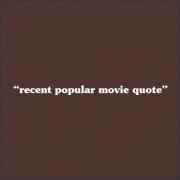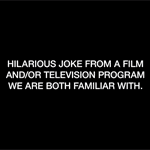How do you judge if a t-shirt is good or not? Some might say it is the quality of the design. Others claim it is the saleability. Yet other might say that the message is important. Perhaps the quality of the material is important or even where it’s made or who it’s made by.
 I regularly see comments on how terrible, boring, old etc. that a particular design is and to be honest I am guilty of it myself. Recently I came across this t-shirt at T-Shirt Hell. I thought it was quite funny and a cool comment on the state of the t-shirt industry at the moment. Not that I am criticizing this trend as that would be the pot calling the kettle black.
I regularly see comments on how terrible, boring, old etc. that a particular design is and to be honest I am guilty of it myself. Recently I came across this t-shirt at T-Shirt Hell. I thought it was quite funny and a cool comment on the state of the t-shirt industry at the moment. Not that I am criticizing this trend as that would be the pot calling the kettle black.
Then I came across this blog where the author shows clear disdain for people engaged in such practices, criticizing people for not using their imagination and encouraging them to think for themselves instead of leeching off the creativity of others. To be honest, I see his point and, in part, I agree with the sentiment.
 In this blog he talks about his discovery of a t-shirt (see right) very similar to the above mentioned t-shirt and how it was making a bold statement. He seems to be saying that this t-shirt is a rallying cry against the exploitation of other people’s work. But, I disagree. I believe that this t-shirt, like the one above, was created with one main purpose – to sell t-shirts. Also, the idea is not so original. “Recent popular movie quote” and the verbose “Hilarious joke from a film and or television program we are both familiar with” can easily be put into the same category as “witty one liner”, “insert political quote here” and “your name here” t-shirts.
In this blog he talks about his discovery of a t-shirt (see right) very similar to the above mentioned t-shirt and how it was making a bold statement. He seems to be saying that this t-shirt is a rallying cry against the exploitation of other people’s work. But, I disagree. I believe that this t-shirt, like the one above, was created with one main purpose – to sell t-shirts. Also, the idea is not so original. “Recent popular movie quote” and the verbose “Hilarious joke from a film and or television program we are both familiar with” can easily be put into the same category as “witty one liner”, “insert political quote here” and “your name here” t-shirts.
In fact, aren’t these t-shirts exploiting the facts that some people hate and other people love these “quote” t-shirts. And they are probably selling to both camps too. I did also notice that the second t-shirt mentioned (from dieselsweeties.com) comes with a free “Less Cowbell” button. Again, this can be seen as a criticism of the use of pop culture quotes (Google “more cowbell”) but isn’t it, in fact, an exploitation of pop culture itself. “Less Cowbell” wouldn’t exist without “More Cowbell”. It would have no meaning and therefore would be no use in attracting people to purchasing the t-shirt. I’m sure the people at dieselsweeties.com are aware of the irony though.
In conclusion, I guess what I am saying is that the t-shirts with pop culture phrases and those that criticize them are both relying on the exploitation pop culture. One is no better or smarter than the other.
In Part 2 I will talk about design.


Please comment with your real name using good manners.